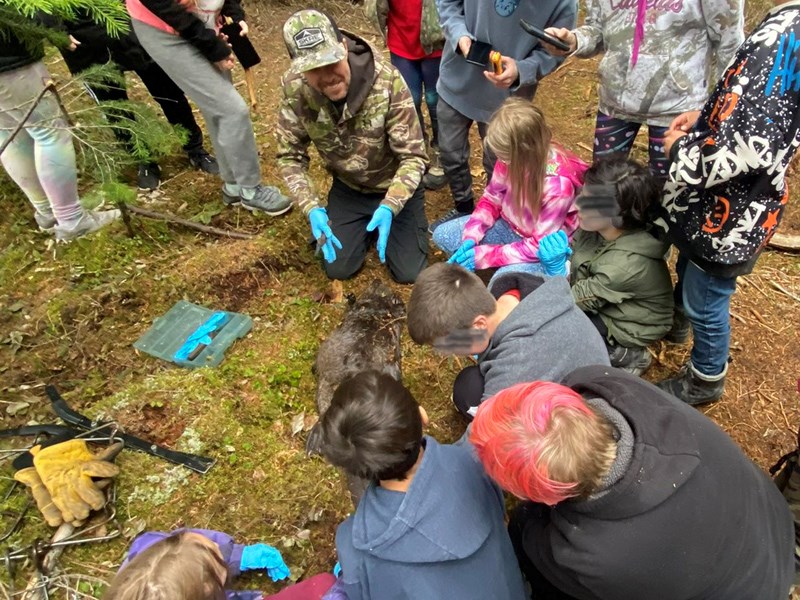There’s a unique program based out of D.P. Todd secondary that takes kids out of the classroom and onto the trapline.
It’s called the Dead Pine Collective and it provides project based and land-based learning opportunities for students in School District No. 57 (SD57).
“We are trying to get the kids engaged in education but in a way they enjoy,” said trapline instructor Reid Roberts, who runs the program along with two other teachers.
The program started in the second semester of 2020 after Roberts experienced so much success taking a few kids from an outdoor ed course onto the trapline.
“If a kid was going to be suspended instead of sending them home, I would take them out to the trapline and try and make a positive connection with the school – that is where the idea or the philosophy came from with the trapline.”
Not only are students spending time in nature, but they are learning about safe and humane trapping technology, sustainable harvest and wildlife management, wildlife biology, fur handling techniques, and the international fur trade.
"There’s a good chunk that have been camping, hunting, and most of them have been fishing but none of them have actually experienced trapping,” said Roberts. “For the most part it is a brand-new experience for them, so they are super excited especially when you harvest something."
In addition to the trapline, the school offers the Grade 10 Hawk Program which is an outdoor program that includes English 10, Socials 10 and a few other courses and the Senior Dead Pine Program for Grade 12s has the same focus but includes senior level courses.
Roberts said the administration wanted to be able to provide the opportunity for students to get credit for these outdoor experiences that keep them connected to the school and so it developed the two junior and senior programs.
“We do overlap so quite often I am taking kids from those classes out to the trapline, but you don’t have to be in that class to go on the trapline.”
While based at D.P. Todd, Roberts is a resource teacher who also works with the district’s Indigenous Education department and takes out elementary school classes from throughout the district to visit the trapline.
“You’ll watch it with the elementary kids, they just start playing. They get out of the vehicles, and they are in the bush, and they are running around and picking up sticks and playing in the water and they are engaged with their surroundings.”
Roberts said he can see an immediate difference in the students once they are learning outside the classroom environment.
“They come out to the trapline – it’s not like there is some big switch, but they start talking – they start asking questions and the best part is they start telling you stories,” said Roberts.
“It’s not just once-in-awhile, it is a regular thing where they become comfortable, and they don’t feel the pressure. They don’t feel anxiety. It’s the social-emotional aspect is probably the most significant quality that we see.”
Roberts said the students do walk away from the experience with important skills like learning how to use simple tools, how to build shelters, or how to be safe around ice or moving water but the biggest impact of the program is just making a connection with the students.
“That is the main reason why we are doing this. It’s not to introduce kids to trapping, which is a side product of this, but it’s getting the kids engaged and feeling comfortable.”
Roberts said one of the big emphases of the programs is land based learning which has an Indigenous focus, but he also sees trapping particularity as a connection of different cultures.
“That’s why I love trapping, because to me, trapping is Canadian. It’s as much European as it is First Nations. You can look through whatever lens you want but to me it’s all blended,” said Roberts.
“We bring Elders out so they can share their stories and I can look at it from a European view and we can blend the two.”
He said land-based learning can be anything – it can be just getting kids out and doing nature hikes, or it can be doing subjects like math, English, or socials on the land.
“We just happen to have a trapping focus.”
Roberts said most schools have an outdoor education program and Duchess Park Secondary also has similar program to D.P. Todd which incorporates traditional courses into outdoor learning activities.
“I don’t know if there are going to be a bunch of teachers in the future or other employees getting their trapping license but it’s opening the doors for people taking their passion and doing whatever they want to do whether its canoeing, mountain biking, or backpacking,” said Roberts.
“We are trying to promote land-based learning and project-based learning and you find the avenue that works for you.”



